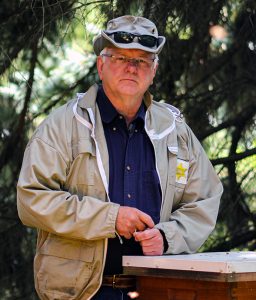by Ann Harman
I gave a Power Point presentation at the Upper Crackerbox Beekeepers Association. The audience was composed of about one-third newbees and the rest more experienced beekeepers. My topic was Preparations for Winter. At the end I innocently asked for questions. I was bombarded! Mostly from the newbees. The questions were on everything ranging from ‘how do I know if my queen is dead?’ to ‘should I still be feeding my package bees?’ All the questions were basic beginning beekeeping questions, nothing out of the ordinary. My question to the club was ‘Do you have a mentor program?’ ’No.’ Back in the early Spring, classes were held on three Saturday afternoons. Package bees were ordered for the class members. Now they were on their own except for the regular monthly meetings.
A newbee, without a mentor, who attends club meetings, may find it difficult to get answers to questions. If the meeting program was about making beeswax candles, that topic is far into the future for someone in their first year. If no refreshments are given at the meeting then there is no time to mingle with experienced beekeepers. The first year is just more difficult without a mentor. It is possible that some of these newbees will have problems that could have easily been solved with a mentor. But – no mentor – no more newbee. Too discouraged to continue.
Every local beekeeping club that holds classes, whether a few or a comprehensive series, needs a Mentor Coordinator. Uh oh – does that mean a struggle to find someone to take care of finding mentors, matching mentors to newbees and making sure everything is going well? Just keep reminding club members that they belong to a small organization run by volunteers so – the more volunteers, the less work for everyone. Besides, organizing mentor/newbee combinations only occurs once a year.
What a difference mentors would have made for those newbees in their very first year of beekeeping. Having a good beekeeping book is great but we have to remember that even a good book does not take into consideration the local climate and the weather. These two cause us to change our beekeeping plans. What about the Internet? Well, the newbees do not have the background to determine if the information is sensible or silly. A mentor could certainly advise a newbee about what to use and what to ignore. But a mentor standing beside a newbee next to the hive is better than a book or the Internet.
Let’s take a trip back in time – to your first year of beekeeping. For some of you that could be just last year. For others it could be 40 years. If you grew up helping your grandfather you actually were very lucky because he was your mentor. If you are in your second year you actually know a little bit about bees and what they do, but still there is much more to discover and learn. If you do remember your first year, think about what sort of help you would have liked. What questions did you have? Did you make any blunders and wonder what to do? In fact, did you recognize you did something foolish?
Every beekeeping club that gives classes for newbees needs to have a Mentor Program. The success of the newbees really does depend on this program. At this point you are thinking that getting any member to do anything, except attend meetings, is practically impossible. But you do have someone to teach the beginner classes. Yes, it is possible for the teacher to be a mentor. But you need more.
Now sit down with your membership list. As you read down the names you realize that your total paid membership is 150 beekeepers. However, meeting attendance hovers around 55. Where are the other 100 on meeting nights? A myriad of reasons – taking a night class in accounting, erratic working hours, choir practice, family responsibilities, can’t drive at night, and more. All perfectly good reasons but many of these members do attend field days, the annual picnic, and some other events. So there is interest in the club activities. A number of these people are known to be good beekeepers and sell excellent quality honey locally. So these beekeepers can be approached and asked to become a part of the club’s Mentor Program. Before you start to contact any of the club members you need to compose your Mentor Program.
So let’s begin with what a mentor is and is not. These points are important to put forward to possible mentors who may view it as taking care of someone else’s bees. A mentor is a guide, not a doer. As a guide, a mentor should be able to acknowledge what the newbee is doing correctly. ‘You did a good job of loading and starting your smoker.’ And, of course, comment on something that will lead to a problem. ‘You just spilled a lot of sugar syrup on the ground – bees will find it quickly and robbing could begin – or – you are going to step on and squish bees who found the syrup. Always keep in mind that to teach is to learn. Nobody will ever know everything about honey bees – that makes it fun!
The only situation where a mentor would actually do something would be to help avoid a bad situation or to salvage an accident. If the newbee drops a hive body, resulting in angry bees in the air and frames displaced then a helping hand in getting things back together will be necessary. At other times a simple demonstration, such as showing a newbee how to use a hive tool effectively is useful.
Since you wish to reach all club members to promote a Mentor Program, write a short description of what a mentor is and does (and does not). Then send this to all the club members with a letter asking them to become a part of the club’s Mentor Program. Such a program has two sides – the mentor and the newbee. That means you should also make a short description of what the newbee can do to make the team of mentor-newbee successful. Explaining both sides may help to recruit mentors who may have been reluctant to become a mentor. Let’s take a look at some items for these two descriptions.
For the mentor the first thought, already mentioned, is that a good mentor is a guide, making suggestions, not doing the work. A mentor has to realize that the newbee may be quite amazed and even a bit fearful doing something with what seems like a gazillion bees capable of stinging. Keep in mind that most people who want to be a beekeeper are accustomed to seeing a few bees in the garden. The few thousand in a package or nuc are probably the most bees in one spot that the newbee has seen.
Today a Mentor Coordinator needs to realize that beekeepers are using different hives and have different approaches to beekeeping. It would be best for the Coordinator to explore what the newbee is planning – Langstroth hive or top bar? Varroa control chemicals or nothing? The Coordinator needs to inquire before assigning an appropriate mentor.
If a mentor can be assigned early in the classes then a mentor visit to the newbee can determine if the newbee has chosen an appropriate place. Also, in black bear regions, does the necessary bear fence allow enough room for opening the hives and moving around? This first visit gives the mentor and newbee time to get acquainted. Yes, it also gives the mentor an opportunity to change to another newbee if something is not satisfactory.
Mentors should live within a reasonable distance of their newbee. What to do if a newbee took your club classes but actually lives much closer to another club? Perhaps your class days were more suitable for the newbee. Coordinate with neighboring clubs to arrange a mentor that lives closer to the newbee. That newbee will probably be attending the other club’s meetings anyway.
Mentor and newbee should exchange contact information – cell phone numbers, home phones if different, and arrange suitable times for phone calls. Determine what action is best if newbee has an emergency – and perhaps what would be an emergency.
One of the important points for the newbee is to consider what is and is not important before phoning the mentor. Go to the beekeeping book first. No, it will not always give you the answer. But think – is it a question that should be answered NOW or can it wait. It is better to make one phone call to the mentor with 10 questions than 10 separate phone calls with one question each.
Everyone is using cell phones as cameras today. A newbee can take a photo and send it to the mentor with a comment or question. This is certainly an easy way to sort out some minor problem or to alert the mentor to a big problem, and it is strongly encouraged.
In class the newbee probably heard about diseases and pests. Descriptions of American foulbrood and the burning of hives become very worrisome to newbees. Two books are available that can be taken to the beeyard for diagnosis. However, what may be more important would be to reassure the newbee that AFB would be extremely rare for their new colonies. However, Varroa is everywhere and in some places so is the small hive beetle. Help the newbee to know what to look for during the first year.
Give a thought to having an Apprentice Mentor Program – made of those beekeepers in their second year. Everyone who is a beekeeper learns something every time a hive is opened and bees inspected. To mentor is to learn! Each mentor can invite an Apprentice Mentor to come and help, learn and give encouragement. An Apprentice Mentor is on their way to being a better beekeeper.
Have a little celebration at the last club meeting of the year. Thank the mentors and present them with a Certificate of Thanks. Then thank the newbees for their successes with their first colonies of bees and wish them a good honey harvest in their second year.
Ann Harman teaches and mentors newbees in and around Flint Hill, VA.








